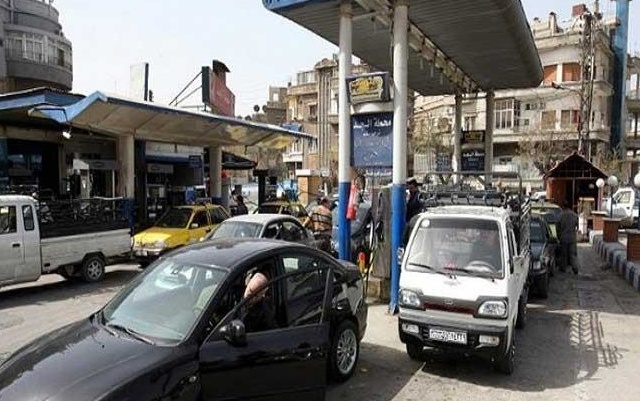Syrians queue at a petrol station amid crippling shortages, April 2019
The Assad regime has admitted a worsening fuel crisis in the areas of Syria under its control.
Oil Minister Bassam Touma said on State TV, blaming US sanctions, “The tightening of the American siege and their barring of imports from arriving forced us to reduce distribution of gasoline by 35%.”
Residents of Damascus and other cities have been testifying to acute shortages, with long queues at petrol stations. The regime introduced measures this summer to limit private vehicles to 30 liters of gasoline every four days.
In June, the US implemented further sanctions, under the Caesar Act, over the Assad regime’s crimes against humanity and the deaths of 10,000s of detainees from executions, torture, and inhumane conditions.
See also EA with Levant News: Covering Syria’s Uprising, 112 Months Later
Amid Syria’s 114-month conflict and widespread corruption, GDP has fallen more than 75%. The Syrian currency has lost about 70% of its value on the unofficial market since last autumn. Prices are skyrocketing, with shortages of food and electricity.
Who Will Supply the Regime?
Most oil and gas fields are in Kurdish-controlled northeast Syria. The Kurdish administration sells some output to the regime, but is insisting autonomy in defiance of Bashar al-Assad’s pledge to “regain every inch” of Syria.
Iran has propped up the regime with lines of credit, worth billions of dollars, that include oil supplies. However, Tehran’s support has been limited by its own economic crisis.
Touma said the gasoline shortage has been exacerbated by maintenance at the Baniyas refinery, the country’s largest, which supplies 2/3rds of demand.
He declared that when the work is finished at the refinery, which produced 130,000 barrels per day, capacity will rise by 25%.
The oil minister also asserted that shipments will help ease the crisis. But he did not disclose the sources, amid the regime’s difficulties in arranging imports.
See also Hunger in Syria as Assad Regime Struggles with Imports
Oil traders said imports through the port in Lebanon’s capital Beirut have been disrupted by an August 4 blast.
Last week Assad asked a Russian delegation, led by Russian Deputy Prime Minister Yuri Borisov and Foreign Minister Sergey Lavrov, for further support.
But amid reports of Russian dissatisfaction with the Syrian leader, there was no confirmation of a commitment from Moscow.

